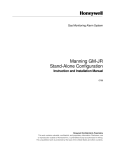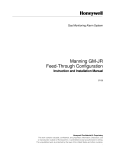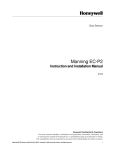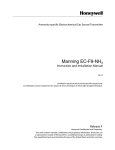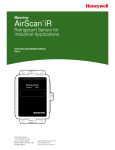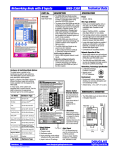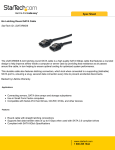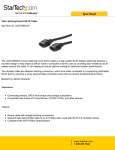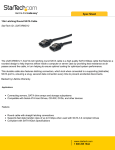Download Honeywell 19546GM1 User's Manual
Transcript
Gas Monitoring Alarm System Manning GM-1 Instruction and Installation Manual 07/09 Release D Draft Honeywell Confidential & Proprietary This work contains valuable, confidential, and proprietary information. Disclosure, use or reproduction outside of Honeywell Inc. is prohibited except as authorized in writing. This unpublished work is protected by the laws of the United States and other countries. Manning GM-1 Gas Monitoring Alarm System 19546 GM1 07/09 REVD Copyright © 2009 Honeywell Analytics. All Rights Reserved. 1 Notices and Trademarks Copyright 2009 by Honeywell International Inc. Release D July 2009 While this information is presented in good faith and believed to be accurate, Honeywell disclaims the implied warranties of merchantability and fitness for a particular purpose and makes no express warranties except as may be stated in its written agreement with and for its customers. In no event is Honeywell liable to anyone for any indirect, special or consequential damages. The information and specifications in this document are subject to change without notice. Manning is a registered trademark of Honeywell International Inc. Other brand or product names are trademarks of their respective owners. Honeywell Analytics 405 Barclay Blvd. Lincolnshire, IL 60069 USA 1-800-538-0363 Manning GM-1 Gas Monitoring Alarm System 19546 GM1 07/09 REVD Copyright © 2009 Honeywell Analytics. All Rights Reserved. 2 About This Document World Wide Web The following Honeywell web sites may be of interest. Honeywell Organization WWW Address (URL) Corporate www.honeywell.com Honeywell Analytics www.honeywellanalytics.com Manning Gas Detection www.manningsystems.com Telephone Contact us by telephone at the numbers listed below. Organization Phone Number United States Honeywell Analytics Inc. 1-800-538-0363 1-913-712-5576 1-913-712-5580 Fax Canada Honeywell Analytics Inc. 1-888-749-8878 Europe Honeywell PACE +44 (0)1202 676161 Asia Pacific Honeywell Asia Pacific Inc. +82 (0)2 2025 0307 Middle East Honeywell Analytics Inc. +971 4 3458 338 Sales Information Contact us at [email protected] Symbol Definitions The following table lists those symbols used in this document to denote certain conditions. Symbol Definition ATTENTION: Identifies information that requires special consideration. CAUTION: Indicates a potentially hazardous situation which, if not avoided, may result in minor or moderate injury. It may also be used to alert against unsafe practices. CAUTION symbol on the equipment refers the user to the product manual for additional information. The symbol appears next to required information in the manual. WARNING: Indicates a potentially hazardous situation, which, if not avoided, could result in serious injury or death. WARNING symbol on the equipment refers the user to the product manual for additional information. The symbol appears next to required information in the manual. CAUTION indicates a situation which, if not avoided, may result in equipment or work (data) on the system being damaged or lost, or may result in the inability to properly operate the process. Manning GM-1 Gas Monitoring Alarm System 19546 GM1 07/09 REVD Copyright © 2009 Honeywell Analytics. All Rights Reserved. 3 Contents Serial number: Section Title Page 1 System Description 5 2 Installation 7 3 Operation 10 4 Limited Warranty 13 Introduction This manual has been prepared to help in the use and installation of the Manning GM-1 Gas Monitoring Alarm System. This manual will convey the operating details of the alarm system, ensure proper installation, and demonstrate start-up and routine maintenance procedures. ATTENTION: This manual must be carefully followed by all individuals who have or will have the responsibility for using or servicing the Manning GM-1 alarm system. Warranties made by Honeywell Analytics with respect to this equipment will be voided if the equipment is not used and serviced in accordance with the instructions in this manual. If in doubt about a procedure, please contact Honeywell Analytics before proceeding. Manning GM-1 Gas Monitoring Alarm System 19546 GM1 07/09 REVD Copyright © 2009 Honeywell Analytics. All Rights Reserved. 4 1 System Description The Manning GM-1 is designed to accept a single 4/20 mA current input signal, plus provide a regulated 24 VDC supply to operate all sensors manufactured by Honeywell Analytics. The Manning GM-1 is housed in a rugged 14 gauge gasketed steel enclosure. Behind the clear plexiglass window is a 20-segment vertical LED bargraph display which gives a visual indication of the gas concentration. The unit has warning and alarm level indications on the front panel, and warning and alarm relays allowing the user to incorporate functions such as ventilation control, remote horns, security system monitoring, and automatic shutdown. Designed to be highly reliable when properly installed, all relays are energized during normal operation, and a sensor fault monitoring circuit will indicate a fault and trip a dedicated fault relay if the signal falls below 1.4 mA. The unit has an audible horn which will sound if an alarm or fault condition is detected. The silence switch will silence the horn until the next event. If an alarm condition initiates the horn, the horn will clear automatically when the alarm relay clears. The unit has a power-up delay feature that places all outputs in normal conditions for one minute to allow for sensor stabilization. The Manning GM-1 will support all of Manning sensors, including oxygen, which requires a downscale alarm. All components that are in contact with voltages above 40 volts are UL listed, including the enclosure. Note: The Manning GM-1 is for use in non-classified areas only. Manning GM-1 Gas Monitoring Alarm System 19546 GM1 07/09 REVD Copyright © 2009 Honeywell Analytics. All Rights Reserved. 5 1 System Description continued System Specifications Electrical Power: 120 VAC, 50/60 Hz at 0.35 amp (230 VAC 50/60 Hz is available as an option) Signal input: 4/20 mA DC Power available for sensors: Heavy-duty internal 24 VDC, 1 amp maximum regulated supply Enclosure: 14 gauge steel, gasketed, 10" high x 8" wide x 4" deep, NEMA 1 rated enclosure with plexiglass window Weight: 11 lbs. Operating Ambient Temperature range: 0o F to +120o F Display: 20-segment LED bargraph Operating Humidity: 5-95% Relative Humidity, noncondensing Light Outputs and Relays: Options: Down-scale Alarm for oxygen Alarm Light and Relay Push-button Controls: • Setpoint field adjustable Silence — Silences internal horn • Alarm Light and Relay independently latchable by board mounted DIP switch • 10 second on delay, 2 second off delay Reset — Clears signal, latched functions, and relays. If warning, alarm, or fault condition exists, indications will return after a short time delay. Warning Light and Relay • Setpoint field adjustable • Warning Light and Relay are NOT latchable • 10 second on delay, 2 second off delay Note: The Manning GM-1 is for use only in non-classified areas. Fault Light and Relay • Setpoint NOT adjustable — all mA signals below 1.4 mA will initiate fault output • Fault Light and Relay always latch • 10 second on delay Note: All relays are normally energized and monitored by individual LEDs for ease of troubleshooting Relay Ratings: 3 amps at 24 VDC or 120 VAC Form C providing NO (normally open) or NC (normally closed) option Manning GM-1 Gas Monitoring Alarm System 19546 GM1 07/09 REVD Copyright © 2009 Honeywell Analytics. All Rights Reserved. 6 2 A Installation Locating the Manning GM-1 When unpacking the unit, inspect all boxes and contents for shipping damage. If any screws or other metal parts are missing, these must be found to ensure that the printed circuit boards will not be damaged when power is applied. Figure 1: Mounting dimensions for the Manning GM-1 Gas Monitoring Alarm System 6" 5/16" The control unit is designed to be mounted on a solid (non-vibrating) wall through four holes in the two mounting flanges. While the physical location must be determined in part by local conditions, it is important to consider the following: Gas Monitor CAUTION • Protect the Manning GM-1 from rain, snow, water sprays, cleaning crews, and physical damage. • Mount the unit on a solid wall (nonvibrating) at eye level for convenience in taking readings, servicing, etc. • The Manning GM-1 is NOT explosion proof. DO NOT MOUNT in a hazardous atmosphere. • Operating temperature for the Manning GM-1 is 0o F to +120o F. • Pre-punched holes are provided in the bottom of the enclosure for cable access. DO NOT drill holes in the top of the cabinet as this will void the warranty. • If hole drilling is required, be sure to remove all metal filings. • Mounting dimensions are included in Figure 1. Manning GM-1 Gas Monitoring Alarm System 19546 GM1 07/09 REVD Copyright © 2009 Honeywell Analytics. All Rights Reserved. Manning GM-1 10 3/4" Reset 24 1/4" Silence 7 2 B Installation continued Wiring Electrical wiring must comply with all applicable codes. Plant equipment that may be involved and operating conditions should be discussed with local operating personnel to determine if any special needs should be taken into account. Relay Wiring: All three relays have Form C, dry contacts. Any required power source must be within the 3 amp rating and fused or current limited to keep from damaging the contacts. • Relay wiring must be run in separate conduit from the sensor cable if the relay circuit is AC. Nearly all start-up problems are due to improper wiring or monitor configuration. Please follow these guidelines carefully. Figure 2 presents a wiring diagram for the Manning GM-1. Sensor Wiring: • See sensor manual for proper sensor cable. AC Power Wiring: • See sensor manual for proper sensor location. • Use only stranded cable for AC power, relay outputs, and sensor input cables. • Never run AC circuits in the same conduit as the sensor cable. • The units must have a proper third wire ground for safety and sensor shielding. Be sure to follow local codes. Note: Relays are energized in a non-alarmed condition so that a power loss in the Manning GM1 will result in an alarm. • All AC cables must be kept away from the incoming sensor cables, i.e., do not put AC cables inside conduit containing sensor cables. • Keep all wiring away from variable speed drives and SCR control units to minimize electrical noise exposure. • Electrical Power: 120 VAC, 50/60 Hz, 0.35 amps. • Electrical power ground: The unit must be properly grounded. Risk of electric shock. Manning GM-1 Gas Monitoring Alarm System 19546 GM1 07/09 REVD Copyright © 2009 Honeywell Analytics. All Rights Reserved. 8 2 Installation continued Figure 2: Wiring diagram for the Manning GM-1 Gas Monitoring Alarm System WARNING ADJUST TP +20V ALARM ADJUST BOT TOP 7 TP WARNING TP ALARM TP SIG ALARM RELAY FAULT RELAY TP CURRENT WARNING RELAY DRAW TP GND 1 6 + C11 + + FUSE RATING 250V 1.0 AMP SHLD GND L N 120 VAC NO C NC WARNING RELAY* NO C NC NO ALARM RELAY* C + 24 SIG NC FAULT RELAY* MODEL G/M MAINBOARD REV D *Relay rating 3 amp. User must fuse to protect. Note: Green wire earth ground must be connected to grounding stud marked Bare wrap— to "SHLD" terminal of sensor Black— to "GND" terminal of sensor Risk of electrical shock. Red— to "+24" terminal of sensor White— to "SIG" terminal of sensor Manning GM-1 Gas Monitoring Alarm System 19546 GM1 07/09 REVD Copyright © 2009 Honeywell Analytics. All Rights Reserved. Potential hazard. 9 3 A Operation Display Panel A 20-segment Bargraph Display indicates the gas concentration level. The bottom LED is always lit to indicate power to the display. The Warning LED indicates the warning level as determined by the warning setpoint has been exceeded. The Warning LED and Warning Relay operate together and never latch. The Alarm LED indicates the alarm level as determined by the alarm setpoint has been exceeded. The Alarm LED and Alarm Relay are independently latchable or non-latchable as determined by the DIP switch on the main board. Standard factory settings are to latch the LED and not latch the relay. C DIP Switch Setting The two position DIP switch in the center of the bottom board controls the latching of the alarm light and alarm relay. Switch 1 (left) controls the alarm relay. Switch 2 (right) controls the alarm light. Putting the switch in the on (up) position will latch the corresponding function. Putting the switch in the off (down) position will cause the corresponding function to be not latched (see Figure 3). This allows the alarm condition to remain activated if desired even if the gas concentration goes back to below the setpoint. Figure 3: Warning adjustment and DIP switch settings The Power LED indicates power to the monitoring unit. This LED will flash during the one minute power up delay indicating that all relays are held in the normal condition to allow for sensor stabilization during power up. The Fault LED indicates a signal input of less than 1.4 mA (0.14 volts) at TP Sig. The Fault LED and Fault Relay always latch. WARNING ADJUST Reset and Silence Switches TP SIG WARNING RELAY 1 2 SW1 AA ALARM RELAY FAULT RELAY 6 + C11 + + FUSE RATING 250V 1.0 AMP SHLD GND L Pushing the Silence switch will silence the horn on the bottom of the Manning GM-1 until the next event occurs. The horn is triggered by a fault or an alarm condition. The horn will clear itself if the alarm and fault relay clear. A warning condition does not trigger the horn. TP ALARM CURRENT Pushing the Reset switch will reset the fault light, fault relay, alarm light, and alarm relay. If either condition still exists, the appropriate light and relay will return to its tripped state after a time delay. 1 BOT TOP TP WARNING TP B ALARM ADJUST TP +20V DRAW TP GND 7 N NO 120 VAC C NC NO WARNING RELAY* C ALARM RELAY* NC NO C +24 SIG NC FAULT RELAY* MODEL G/M MAINBOARD REV D 0.4 - 2.0 V VDC Black - Warning adjust pot DIP switches on bottom of board Red + Do Not Adjust! Factory set pots Risk of electrical shock. Potential hazard. Manning GM-1 Gas Monitoring Alarm System 19546 GM1 07/09 REVD Copyright © 2009 Honeywell Analytics. All Rights Reserved. 10 3 D Operation continued Signal and Setpoints The voltage between TP Gnd and TP Sig indicates the current signal received from the sensor. The normal range is 0.4 volts to 2.0 volts, which corresponds with 4/20 mA. This manual will use the voltage at TP Sig to describe the input signal. When this signal exceeds the voltage at TP Warning or TP Alarm, the warning or alarm function will take place. The warning setpoint is user adjustable by looking at the voltage on TP Warning and adjusting the warning adjust pot until the desired setpoint is reached (see Figure 3). The alarm adjust pot and TP Alarm function the same way. The warning and alarm setpoints are factory adjusted as indicated on the data sheet included with your GM-1. Never adjust these setpoints outside the range of 0.4 to 2.0 volts. Contact Honeywell Analytics if you have any questions or want help in determining setpoints for your particular sensor and application. After setpoint adjustment always expose sensor to the gas being monitored and verify that the warning and alarm lights trigger at the desired concentration as displayed by the bargraph. E Start-Up Procedures Before applying power, make a final check of all wiring for continuity, shorts, grounds, etc. It is usually best to disconnect external alarms and other equipment from the unit until the initial start-up procedures are completed. After power-up, allow 24 hours for the system to stabilize before testing the sensor. Because sensors are normally located at a distance from the monitoring unit, the test time required and accuracy of the response checks will be improved if two people perform the start-up procedures and use radio contact. F Troubleshooting The Fault Light and Fault Relay always latch when a fault condition is detected. After the condition is corrected the Reset switch must be pressed to clear the Fault Light and Fault relay. The unit will indicate a fault if the signal is less than 0.14 volts at TP Sig. Some Manning sensors are configured to send a signal of 0.05 volts at TP Sig if a sensor fault exists. If TP Sig = 0.05 volts, this indicates a properly wired sensor is in a fault condition. Proceed to investigate the sensor. If TP Sig = 0.00 volts, this indicates no signal from the sensor. Check for correct wiring or loose connections between the sensor and monitoring unit. Each relay has a green LED in series with its coil. If this LED is on, this indicates that the relay is energized and contacts will be in the normal position. If this LED is off, the contacts will be in the tripped condition. Power supply voltages should be checked at TP +20V on the display board and at +24 on the sensor input terminal block (see Figure 4). Both points should be DC Volts as labeled. The total sensor current draw can be checked by looking at the voltage between the two TP Current Draw test points. 1.0mV corresponds to 10 mA, and 50.0mV corresponds to 500mA, etc. Compare this reading with the current draw expected for the sensor you are using (see appropriate sensor manual). If questions arise, call Honeywell Analytics. Start-Up Test: One person exposes the sensor to a small amount of the gas that is being monitored. The second person stays at the monitoring unit to determine that the sensor, when exposed to the target gas, is connected to the proper input, responds, and causes appropriate alarm functions. Manning GM-1 Gas Monitoring Alarm System 19546 GM1 07/09 REVD Copyright © 2009 Honeywell Analytics. All Rights Reserved. 11 3 Operation continued Maintenance G Replacement Parts H The Manning GM-1 is designed for long life and high reliability. Honeywell Analytics recommends checking signal voltages monthly and logging them on the data sheet included with your Manning GM-1. Additionally, the sensor being monitored should be exposed to the target gas on a monthly basis while all alarm functions are verified at the Manning GM-1. This will test the sensor and any equipment connected to the relays in addition to the Manning GM-1. For replacement parts, contact Honeywell Analytics. Be sure to give serial number and model number of unit. Figure 4: Troubleshooting the Manning GM-1 Gas Monitoring Alarm System Display power supply voltage Sensor current draw (1mV per 10 mA) +20V SENSOR DEPENDENT VDC mVDC Red + Black - TP GND WARNING ADJUST TP +20V BOT TOP 7 TP WARNING TP ALARM TP SIG WARNING RELAY ALARM RELAY FAULT RELAY 0.4 - 2.0 V VDC Red + ALARM ADJUST CURRENT DRAW Black - TP AC fuse +24V VDC 1 6 + C11 + + FUSE RATING 250V 1.0 AMP SHLD GND Black - +24 Red + SIG Black L N 120 VAC NO C NC NO WARNING RELAY* C ALARM RELAY* NC NO C Red + NC FAULT RELAY* MODEL G/M MAINBOARD REV D Power supply voltage to sensor Signal from sensor Risk of electrical shock. Potential hazard. Manning GM-1 Gas Monitoring Alarm System 19546 GM1 07/09 REVD Copyright © 2009 Honeywell Analytics. All Rights Reserved. 12 4 1. 2. Limited Warranty Limited Warranty Honeywell Analytics, Inc. warrants to the original purchaser and/or ultimate customer (“Purchaser”) of Manning products (“Product”) that if any part thereof proves to be defective in material or workmanship within eighteen (18) months of the date of shipment by Honeywell Analytics or twelve (12) months from the date of first use by the purchaser, whichever comes first, such defective part will be repaired or replaced, free of charge, at Honeywell Analytics’ discretion if shipped prepaid to Honeywell Analytics at 405 Barclay Blvd., Lincolnshire, IL 60069, in a package equal to or in the original container. The Product will be returned freight prepaid and repaired or replaced if it is determined by Honeywell Analytics that the part failed due to defective materials or workmanship. The repair or replacement of any such defective part shall be Honeywell Analytics’ sole and exclusive responsibility and liability under this limited warranty. 3. Warranty Limitation and Exclusion Honeywell Analytics will have no further obligation under this limited warranty. All warranty obligations of Honeywell Analytics are extinguishable if the Product has been subject to abuse, misuse, negligence, or accident or if the Purchaser fails to perform any of the duties set forth in this limited warranty or if the Product has not been operated in accordance with instructions, or if the Product serial number has been removed or altered. 4. Disclaimer of Unstated Warranties THE WARRANTY PRINTED ABOVE IS THE ONLY WARRANTY APPLICABLE TO THIS PURCHASE. ALL OTHER WARRANTIES, EXPRESS OR IMPLIED, INCLUDING, BUT NOT LIMITED TO, THE IMPLIED WARRANTIES OF MERCHANTABILITY OR FITNESS FOR A PARTICULAR PURPOSE ARE HEREBY DISCLAIMED. Exclusions 5. Limitation of Liability IT IS UNDERSTOOD AND AGREED THAT HONEYWELL ANALYTIC’S LIABILITY, WHETHER IN CONTRACT, IN TORT, UNDER ANY WARRANTY, IN NEGLIGENCE OR OTHERWISE SHALL NOT EXCEED THE AMOUNT OF THE PURCHASE PRICE PAID BY THE PURCHASER FOR THE PRODUCT AND UNDER NO CIRCUMSTANCES SHALL HONEYWELL ANALYTICS BE LIABLE FOR SPECIAL, INDIRECT, OR CONSEQUENTIAL DAMAGES. THE PRICE STATED FOR THE PRODUCT IS A CONSIDERATION LIMITING HONEYWELL ANALYTICS’ LIABILITY. NO ACTION, REGARDLESS OF FORM, ARISING OUT OF THE TRANSACTIONS UNDER THIS WARRANTY MAY BE BROUGHT BY THE PURCHASER MORE THAN ONE YEAR AFTER THE CAUSE OF ACTIONS HAS OCCURRED. A. If gas sensors are part of the Product, the gas sensor is covered by a twelve (12) month limited warranty of the manufacturer. B. If gas sensors are covered by this limited warranty, the gas sensor is subject to inspection by Honeywell Analytics for extended exposure to excessive gas concentrations if a claim by the Purchaser is made under this limited warranty. Should such inspection indicate that the gas sensor has been expended rather than failed prematurely, this limited warranty shall not apply to the Product. C. This limited warranty does not cover consumable items, such as batteries, or items subject to wear or periodic replacement, including lamps, fuses, valves, vanes, sensor elements, cartridges, or filter elements. Manning GM-1 Gas Monitoring Alarm System 19546 GM1 07/09 REVD Copyright © 2009 Honeywell Analytics. All Rights Reserved. 13













